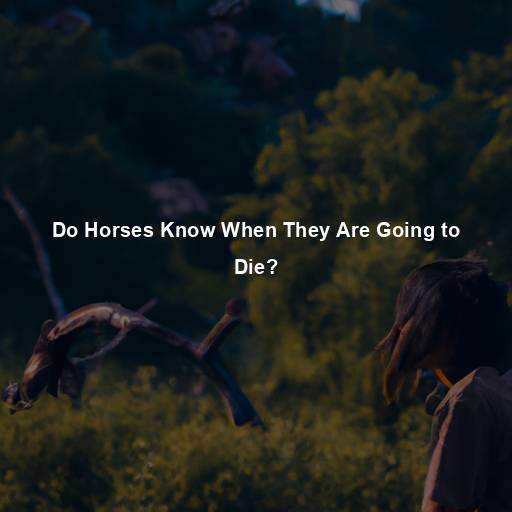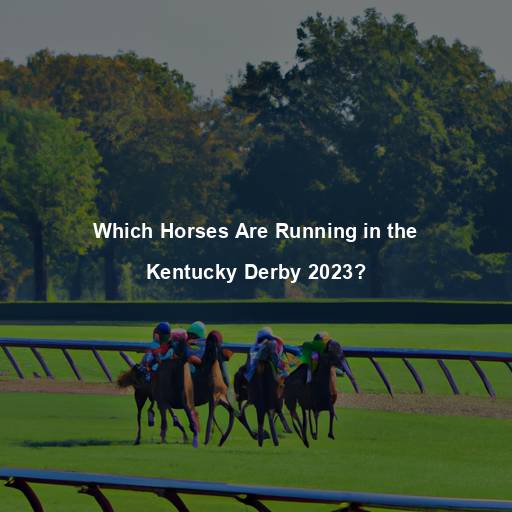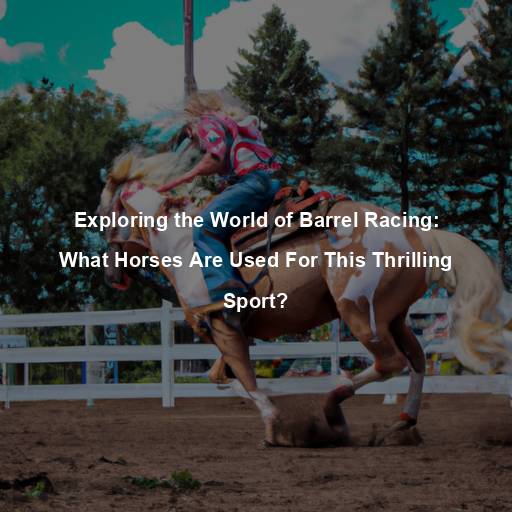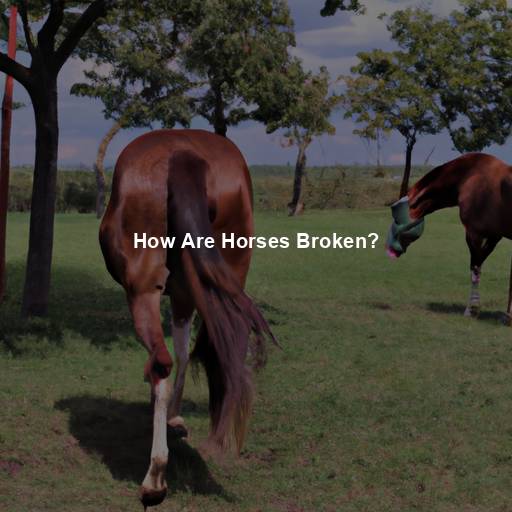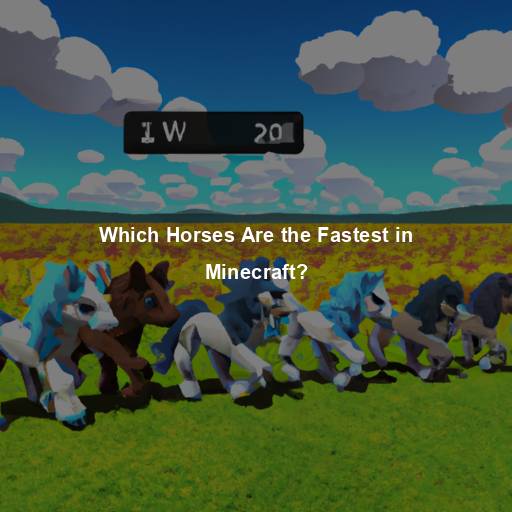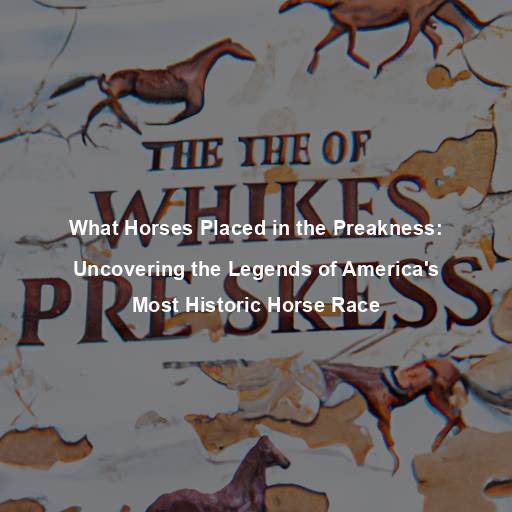Do Horses Know When They Are Going to Die?
Last Updated on November 6, 2023 by Evan
Contents
- 1
- 2 The Consciousness of Horses
- 3 The Elusive Sixth Sense
- 4 The Power of Observation
- 5 The Mystery Persists
- 6 Cultural and Historical Perspectives
- 7 Ethical Considerations
- 8 The Unanswered Question
- 9 The Unanswered Question Persists
- 10 FAQs – Do horses know when they are going to die?
- 10.1 Does a horse have an awareness of its impending death?
- 10.2 Can a horse sense its own impending death?
- 10.3 How do horses typically behave when they are nearing the end of their lives?
- 10.4 Can a horse show signs of acceptance or resignation when approaching death?
- 10.5 How can horse owners provide comfort and support during a horse’s final days?
- 10.6 Is euthanasia a humane option for terminally ill horses?
- 10.7 How can horse owners cope with the loss of their beloved animal?
For centuries, the captivating allure of horses has captivated our hearts. Their elegance, power, and poise have forged a profound connection with humanity, leading us to wonder about the depths of their understanding. Amidst this enigmatic bond, a perplexing question arises: Can horses truly sense the approach of their own mortality? Are they endowed with a sixth sense, enabling them to grasp the concept of their impending demise?
The Consciousness of Horses
Understanding Equine Perception
To shed light on the topic, we must first understand the consciousness of horses. While it is challenging to fully grasp the subjective experience of any living being, scientists and experts in animal behavior have made significant strides in deciphering equine perception. Horses, like humans, possess a complex nervous system capable of processing sensory information, responding to stimuli, and forming memories. However, their perception of the world differs from ours due to their evolutionary adaptations as prey animals.
The Role of Instincts
Throughout the ages, horses have undergone an intricate and fascinating journey of adaptation. Gifted with exceptional senses, they have honed their ability to perceive the world around them, allowing them to thrive amidst both beauty and peril. Their sharp hearing, keen eyesight, and delicate sense of smell serve as a symphony of awareness, guiding them through the labyrinthine landscapes they call home. In the untamed wild, these majestic creatures face constant tests of survival, fueling the enigmatic allure of their purported sixth sense – the unfathomable ability to sense the presence of death.
The Elusive Sixth Sense
Anecdotal Evidence
Throughout history, there have been numerous accounts of horses exhibiting unusual behavior prior to catastrophic events, including natural disasters and the passing of their human companions. These anecdotes often describe horses displaying signs of distress, agitation, or an uncanny ability to predict imminent danger. While individual experiences cannot be dismissed outright, it is essential to approach such stories with caution and seek scientific evidence to support or debunk these claims.
Scientific Studies
To date, scientific research on the ability of horses to anticipate their own death is limited. The inherent challenges in studying animal consciousness and emotions make it difficult to design experiments that definitively answer this question. However, a 2019 study conducted at the University of Sussex shed some light on the topic. The researchers investigated whether horses possess an understanding of mortality by exposing them to different visual stimuli associated with life and death.
The Power of Observation
Reading Equine Cues
The intriguing topic of horses’ mysterious awareness of their own mortality remains an enigma, with conflicting scientific evidence leaving us pondering the depths of equine cognition. Nevertheless, those who have the privilege of spending time with these majestic creatures often find themselves in awe of the profound connection that forms. Through attentive observation and intimate experiences, horse owners and caretakers gain a nuanced understanding of their equine companions. These sentient beings exhibit an extraordinary perceptiveness, effortlessly deciphering subtle nuances in their environment and even mirroring the emotional shifts of those around them.
Bond and Attachment
Horses, those majestic creatures that grace our lives with their presence, have a captivating ability to forge unbreakable bonds with both humans and their fellow equine companions. These extraordinary relationships are intricately woven together by threads of trust, mutual respect, and a profound understanding that transcends mere verbal communication. Within this complex tapestry of connection, the enigmatic realm of equine emotions unfolds, revealing a captivating phenomenon that leaves us awestruck – the horse’s uncanny aptitude for reflecting the emotional states of those in its proximity. It is in moments of vulnerability, when illness or distress invades our lives, that these magnificent creatures unveil their empathetic nature, blurring the boundaries of instinct and perhaps even touching upon an enchanting sixth sense.
The Mystery Persists
Uncharted Territory
The secrets of a horse’s inner world have long intrigued and puzzled researchers. Their enigmatic consciousness unveils a perplexing landscape, where the depths of their subjective experience remain elusive. While we may never fully fathom the intricacies of their perception and response mechanisms, the undeniable fact remains that horses possess a remarkable ability to navigate and engage with their surroundings. Among the mysteries yet to be unraveled is whether these majestic creatures hold an intuitive understanding of their own mortality, a mystifying inquiry that fuels our curiosity and motivates ongoing exploration.
A Connection Beyond Understanding
The fascinating bond between humans and horses defies scientific explanation, captivating our hearts with an enchanting connection. Despite the uncertain scientific evidence surrounding this bond, the profound impact horses have on our lives is irrefutable. Their innate ability to heal our hearts, impart valuable lessons on love, trust, and companionship, leaves us in awe of this mysterious sixth sense they possess.
Sensitivity to Changes
While the notion of horses having a sixth sense may be intriguing, it is essential to consider alternative explanations for their behavior. Horses are incredibly sensitive animals, capable of picking up on subtle changes in their environment and the people around them. They are attuned to variations in tone of voice, body language, and even the slightest shifts in energy. It is possible that horses may exhibit behavioral changes not because they possess a supernatural ability to sense death, but rather due to their acute perception of subtle cues indicating distress or impending change.
Emotional Contagion
There could be an intriguing aspect to horses’ enigmatic behavior that goes beyond mere intuition. It appears that horses possess a unique ability to be influenced by and reflect the emotions of those in their presence, a phenomenon known as emotional contagion. As social creatures, horses are remarkably sensitive to the emotional states of their human counterparts, absorbing and mirroring the energy that surrounds them. In this light, it becomes plausible that horses might exhibit signs of unease or distress when they detect emotional upheaval or a looming sense of loss emanating from their human caregivers.
Cultural and Historical Perspectives
Legends and Folklore
Across centuries, the enigmatic presence of horses has woven itself into the very fabric of our collective human tapestry. Delving into fables, myths, and folklore, these majestic creatures often transcend the bounds of reason, displaying awe-inspiring prowess and an uncanny connection to dimensions that elude our mortal grasp. The allure of their seemingly supernatural abilities has only amplified the intrigue surrounding their purported sixth sense, compelling us to explore the depths of this mysterious phenomenon. However, as we delve into these captivating narratives, it becomes imperative that we exercise discernment, discerning the delicate balance between imaginative lore and the rigor of scientific investigation.
Cultural Beliefs
Cultural beliefs and superstitions also play a role in shaping our understanding of horses and their perceived abilities. In some cultures, horses are considered sacred, spiritual creatures with a heightened connection to the divine or supernatural realms. These beliefs may influence the interpretation of equine behavior and reinforce the notion of horses possessing an innate knowledge of their own mortality. Exploring the cultural context surrounding horses can offer valuable insights into the origins and persistence of such beliefs.
Ethical Considerations
Care and Compassion
As the enigmatic aura surrounding the existence of a equine sixth sense continues to bewilder, it behooves us, as stewards of these majestic creatures, to cast our gaze upon their well-being with utmost earnestness. In the delicate tapestry of sentient beings, horses weave intricate emotional patterns that call upon our tender regard. Their multifaceted needs transcends the mere intrigue of their supposed powers, beckoning us to deliver unwavering care that encompasses their physical and metaphysical realms. A veritable tapestry of nourishment, medical vigilance, and a sanctuary brimming with security should reign supreme as we navigate the enigma of these captivating beings.
Emotional Support
In times of illness or the approaching end of life, horses, like any other living beings, benefit from emotional support and comfort. It is crucial to approach end-of-life care with empathy and sensitivity, ensuring that horses are provided with a peaceful and dignified experience. This includes consulting with veterinarians and experienced professionals who can guide us in making informed decisions regarding their welfare.
The Unanswered Question
Embracing the Mystery
The enigmatic nature of horses and their alleged ability to sense their own mortality continues to fascinate both scientists and horse enthusiasts alike. Despite significant advancements in equine research, the intricate interplay between animal consciousness and emotions presents an enduring conundrum. It behooves us, therefore, to approach this captivating subject with utmost reverence, acknowledging the enigmatic depths that pervade the intricate fabric of the animal kingdom.
Awe and Wonder
The sheer possibility of horses’ hidden prowess, even in the face of a scarcity of empirical proof, leaves us in a state of deep bewilderment. The mystical connection forged between humans and these majestic creatures defies logic and rationality, surpassing the confinements of our scientific grasp. It is a profound union constructed upon the foundations of trust, an unspoken dialogue, and a shared reverence. Regardless of whether horses possess a mystical sixth sense, their existence in our lives serves as an eternal wellspring of admiration, marvel, and an unyielding admiration for the enigmatic intricacies of the animal realm.
Unveiling the Enigma
The enigmatic realm of equine awareness continues to mystify and mesmerize, as we humbly navigate the uncharted waters of their consciousness. While the true extent of a horse’s subjective experience eludes our grasp, their profound sensitivity to the surrounding world is a certainty we cannot ignore. The tantalizing enigma that lingers like an ethereal mist is whether these majestic creatures possess an intuitive inkling of their own mortality, an enigma that provokes intellectual restlessness and sparks relentless exploration. As we plunge deeper into the captivating enigma of equine behavior, we must remain poised with open minds and an insatiable thirst for enlightenment, unraveling the enigmatic tapestry of their existence one delicate thread at a time.
Bridging the Gap
For centuries, the enigmatic nature of horses has captivated our curiosity. Now, a groundbreaking collaboration of brilliant minds from diverse fields aims to unravel the perplexing question of equine consciousness. By merging objective scientific data with the subjective observations of experts in animal behavior, veterinary medicine, and psychology, this interdisciplinary approach holds the promise of shedding light on the mysterious realm of horses’ ability to anticipate their own mortality. In this pursuit of knowledge, we embark on a journey as captivated explorers, eager to bridge the gap between scientific inquiry and the captivating anecdotes that have mesmerized us for centuries.
Interpreting Equine Signals
While scientific studies offer valuable insights, horse owners and caretakers can contribute to our understanding by paying close attention to their equine companions. Through keen observation and interpretation of equine signals, we can uncover subtle clues that may shed light on their awareness of mortality. Changes in behavior, appetite, social interactions, or even their response to specific environmental cues may provide glimpses into their internal state.
Emotional Resonance
Horses have a remarkable ability to mirror the emotions of those around them. They can sense and respond to human emotional states, often acting as emotional barometers. In times of distress or impending loss, horses may exhibit heightened sensitivity and display behaviors that reflect the emotional resonance they feel from their human caregivers. Recognizing and acknowledging this emotional connection can deepen our understanding of their responses and contribute to a more comprehensive understanding of equine consciousness.
Legends and Myths
Throughout history, horses have captivated our collective imagination, entwining themselves into our cultural fabric with an air of mystique and wonderment. From the awe-inspiring Pegasus of mythological tales to the gallant steeds ridden by ancient warriors, these majestic creatures have been revered for their seemingly otherworldly prowess. Legends and folklore abound, imbuing horses with an otherworldly wisdom and a profound link to the ethereal plane. Delving into these narratives and their profound influence on our beliefs sheds light on the enigmatic notion of horses‘ purported sixth sense.
Symbolism and Beliefs
Throughout history, horses have bewildered and captivated the human imagination, their enigmatic qualities intertwining with cultural beliefs and superstitions. Embraced as heralds of strength, wisdom, and intuition in diverse cultures, these majestic creatures have transcended the realms of mere physicality. Many find solace in the conviction that horses possess an innate ability to delve into the depths of spirituality, traversing boundaries of the unseen. These profound convictions deeply shape our comprehension of equine consciousness, forever leaving an indelible mark on our interpretations of their behavior.
Compassionate Care
As we contemplate the enigmatic notion of horses having a sixth sense, it becomes imperative for us to delve into the depths of ethical principles that should govern our interactions and guardianship of these majestic beings. Nurturing an environment that exudes safety and comfort, coupled with ensuring access to vital nutrition and healthcare, must form the bedrock of responsible horse ownership. Moreover, facilitating opportunities for these social creatures to interact and forge connections is a crucial aspect of cultivating a symbiotic and harmonious rapport between our kind and theirs. By embracing kindness, respect, and empathy, we not only safeguard their well-being but also nurture a profound bond with these awe-inspiring companions.
End-of-Life Care
As we face the somber realities of sickness and mortality, it becomes evident that our equine companions deserve nothing short of compassionate and dignified care in their final days. When navigating this poignant chapter, seeking guidance from seasoned experts in equine palliative care and collaborating closely with trusted veterinarians is imperative. By embracing a holistic approach that revolves around the horse’s physical and emotional needs, we can usher them through a tranquil transition, all the while paying tribute to the profound connection we have forged with these magnificent beings.
The Unanswered Question Persists
A Journey of Discovery
Our exploration into the consciousness of horses is an ongoing journey. It invites us to remain curious, open-minded, and receptive to new knowledge and insights. By combining scientific research, anecdotal evidence, and cultural perspectives, we can continue to expand our understanding of equine behavior and deepen our connection with these extraordinary animals.
FAQs – Do horses know when they are going to die?
Does a horse have an awareness of its impending death?
When it comes to the mysterious realm of equine cognition, the enigma of mortality dances gracefully in the shadows. Alas, it remains a perplexing endeavor to fathom the depth of a horse’s conscious grasp on the concept of death. Although the veils of uncertainty shroud our understanding, we can observe the enigmatic creatures manifest instinctual behaviors and reactions in the face of illness or injury. While the secrets of their self-awareness puzzle us, the allure of these majestic creatures remains undiminished.
Can a horse sense its own impending death?
As horse enthusiasts and caretakers, we often find ourselves caught in the intriguing web of equine behavior. Many of us have pondered over whether horses possess an innate intuition or even a sixth sense when it comes to their own mortality. The mysterious signs and subtle shifts that we sometimes witness, like unusual behavior, withdrawal, or a diminished appetite, can indeed spark thoughts of impending doom. However, it is essential to tread cautiously and consider a plethora of factors at play, be it the creeping claws of old age, the aftermath of an injury, or the effects of an underlying illness.
How do horses typically behave when they are nearing the end of their lives?
In the final stages of a horse’s life, it is not uncommon to observe specific behavioral changes. These may include decreased activity, loss of appetite, weight loss, reduced interest in social interactions, listlessness, increased time spent lying down, or difficulty in standing up. These behaviors may indicate that a horse’s health is deteriorating, and it is advisable to consult with a veterinarian to ensure the horse’s comfort and well-being.
Can a horse show signs of acceptance or resignation when approaching death?
There have been anecdotes and observations suggesting that some horses may exhibit a sense of acceptance or resignation as they near their end. They may be less resistant to medical interventions, become more docile, or exhibit a calm demeanor. However, it is important to note that each horse’s response to death can vary significantly, and not all horses exhibit these behaviors.
How can horse owners provide comfort and support during a horse’s final days?
When a horse is approaching the end of its life, it is crucial to focus on providing comfort and ensuring a peaceful environment. Creating a quiet and stress-free space, maintaining a consistent routine, providing pain relief medications if necessary, and offering appropriate nutrition can all contribute to the horse’s well-being during this difficult time. Consulting with a veterinarian experienced in end-of-life care can also provide invaluable guidance and support for both the horse and its owner.
Is euthanasia a humane option for terminally ill horses?
Euthanasia is a commonly accepted practice for horses suffering from terminal illnesses or experiencing severe pain or distress. When a horse’s quality of life has significantly deteriorated, and there are no viable treatment options available, euthanasia can be a compassionate choice to alleviate unnecessary suffering. It is important for horse owners to consult with a veterinarian to assess the horse’s condition and make a well-informed decision.
How can horse owners cope with the loss of their beloved animal?
Losing a beloved horse can be an overwhelming whirlwind of emotions, leaving even the sturdiest of horse owners stumbling through a maze of perplexity. In these trying times, it’s crucial to grant yourself the grace to grieve and lean on the pillars of support around you—those who comprehend the extraordinary connection between humans and these majestic creatures. Nurturing your soul through self-care rituals like mindfulness or, perhaps, seeking guidance from a certified counselor might help navigate the labyrinth of healing. As you tread onward, it’s vital to hold tight to the cherished memories that made your equine companion so special, as they have the power to eventually bring a bittersweet solace amidst the waves of acceptance.

